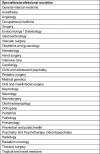Introducing entrustable professional activities for postgraduate medical training in Switzerland
- PMID: 39711863
- PMCID: PMC11656180
- DOI: 10.3205/zma001715
Introducing entrustable professional activities for postgraduate medical training in Switzerland
Abstract
Introduction: Graduate medical education is being reformed in many countries, with a focus on the principles of competency-based medical education (CBME). A main novel aspect in this context is the implementation of entrustable professional activities (EPAs). The introduction of EPAs aims to better align training curricula with clinical practice, provide individualized supervision, and enhance the quality of feedback.
Project description: This project report presents the development of a national strategy and the initial results of implementing entrustable professional activities in the Swiss context.
Results: Affiliated with the Swiss Institute of Medical Education (SIME), an EPA-Commission was established with the mandate to develop a strategy and provide guidance to medical specialty societies. To date, 28 out of 45 specialty societies have sought advice from the EPA-Commission and have begun developing EPAs. Concurrently, the Commission has expanded the national faculty development courses, adapted the content, started offering multilingual courses, and has published a series of articles on CBME and EPAs. Selected pilot hospitals are now planning to implement EPA-based graduate medical education curricula. Additionally, the introduction of a nationwide electronic solution (app) for assessing EPAs is planned.
Conclusion: The introduction of EPAs in graduate medical education is a multilayered project. In addition to medical education aspects, various social, organizational, and professional-political factors are crucial for the transformation processes. In the Swiss context, such a reform has been successfully initiated. Continuous evaluations of the ongoing projects will provide further insights for competency-based graduate medical education reforms.
Einleitung: Die ärztliche Weiterbildung wird in zahlreichen Ländern reformiert. Im Zentrum stehen dabei die Prinzipien der kompetenzbasierten Aus- und Weiterbildung (Competency-based Medical Education, CBME). Eine wesentliche Neuerung in den letzten Jahren ist hierbei die Arbeit mit Entrustable Professional Activities (EPA). Deren Einführung zielt wesentlich auf eine bessere Passung von Weiterbildungscurricula und klinischer Arbeit, individualisierter Supervision und Verbesserung der Feedbackqualität ab.
Projektbeschreibung: Im vorliegenden Projektbericht werden eine nationale Strategieentwicklung und erste Ergebnisse der Entwicklung von Entrustable Professional Activities im schweizerischen Kontext dargestellt.
Ergebnisse: Angegliedert an das schweizerische Institut für ärztliche Weiter- und Fortbildung (SIWF) wurde eine EPA-Kommission mit dem Auftrag einer Strategieentwicklung und Beratung der Fachgesellschaften eingerichtet. Insgesamt 28 von 45 Fachgesellschaften haben bisher die Beratung durch die EPA-Kommission für die EPA-Entwicklung in Anspruch genommen und mit der EPA-Entwicklung begonnen. Begleitend wurde durch die Kommission das nationale Fakultätsentwicklungsangebot inhaltlich und mehrsprachig weiterentwickelt und eine Artikelserie zu CBME und EPAs publiziert. Ausgewählte Pilotspitäler planen nun EPA-basierte Implementierungen entsprechender Weiterbildungscurricula. Zudem ist die Einführung einer landesweiten elektronischen Lösung (APP) zur Erfassung der EPAs vorgesehen.
Schlussfolgerung: Die Einführung von EPAs in der ärztlichen Weiterbildung ist ein komplexes Projekt. Dabei spielen verschiedene gesellschaftliche, organisatorische und berufspolitische Rahmenbedingungen, neben den medizindidaktischen, eine entscheidende Rolle für Umgestaltungsprozesse. Im schweizerischen Kontext konnte eine solche Reform erfolgreich gestartet werden. Kontinuierliche Evaluationen der laufenden Projekte werden weitere Erkenntnisse für kompetenzbasierte Weiterbildungsreformen liefern.
Keywords: change management; competency-based medical education; entrustable professional activities; faculty development.
Copyright © 2024 Pinilla et al.
Conflict of interest statement
The authors declare that they have no competing interests.
Figures


Similar articles
-
Competency-based education - the reform of postgraduate medical training in Switzerland.GMS J Med Educ. 2024 Nov 16;41(5):Doc62. doi: 10.3205/zma001717. eCollection 2024. GMS J Med Educ. 2024. PMID: 39711866 Free PMC article.
-
[Entrustable Professional Activities in Graduate Medical Education in Psychiatry: A Promising Concept].Praxis (Bern 1994). 2021 Jan;110(1):30-36. doi: 10.1024/1661-8157/a003601. Praxis (Bern 1994). 2021. PMID: 33406929 German.
-
A systematic review of 7 years of research on entrustable professional activities in graduate medical education, 2011-2018.Med Educ. 2019 Mar;53(3):234-249. doi: 10.1111/medu.13792. Epub 2019 Jan 4. Med Educ. 2019. PMID: 30609093
-
Implementation of Entrustable Professional Activities in General Surgery: Results of a National Pilot Study.Ann Surg. 2023 Oct 1;278(4):578-586. doi: 10.1097/SLA.0000000000005991. Epub 2023 Jul 13. Ann Surg. 2023. PMID: 37436883
-
Working with entrustable professional activities in clinical education in undergraduate medical education: a scoping review.BMC Med Educ. 2021 Mar 19;21(1):172. doi: 10.1186/s12909-021-02608-9. BMC Med Educ. 2021. PMID: 33740970 Free PMC article.
References
-
- Frank JR, Snell LS, Ten Cate O, Holmboe ES, Carraccio C, Swing SR, Harris P, Glasgow NJ, Campbell C, Dath D, Hareden RM, Iobst W, Long DM, Mungroo R, Richardson DL, Sherbino J, Silver I, Taber S, Talbot M, Harris KA. Competency-based medical education: theory to practice. Med Teach. 2010;32(8):638–645. doi: 10.3109/0142159X.2010.501190. - DOI - PubMed
MeSH terms
LinkOut - more resources
Full Text Sources
Research Materials

